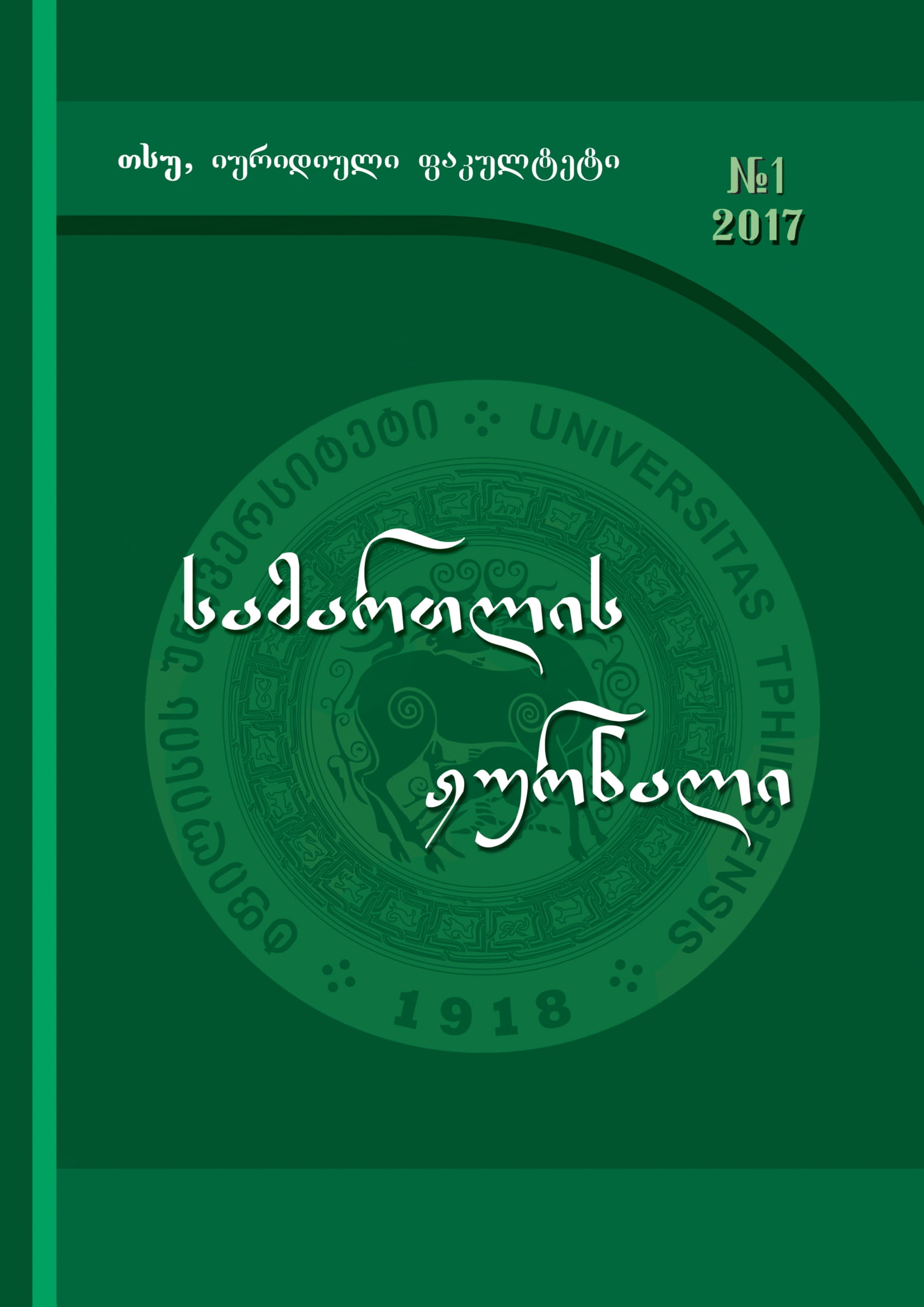ვალდებულების უხეში დარღვევა როგორც შრომითი ხელშეკრულების შეწყვეტის საფუძველი
საკვანძო სიტყვები:
უხეში დარღვევა, ხელშეკრულების შეწყვეტა, შრომის კოდექსი.ანოტაცია
შრომით ურთიერთობებში ერთ-ერთი ყველაზე პრობლემატური საკითხი შრომითი ხელშეკრულების შეწყვეტაა. საქართველოს შრომის კოდექსი ამომწურავად განსაზღვრავს შრომითი ხელშეკრულების შეწყვეტის საფუძვლებს. წინამდებარე სტატია სწორედ შრომითი ხელშეკრულების შეწყვეტის ერთ-ერთ საფუძველს ეხება, რომელიც ითვალისწინებს დასაქმებულის მიერ მისთვის ინდივიდუალური შრომითი ხელშეკრულებით ან კოლექტიური ხელშეკრულებით ან/და შრომის შინაგანაწესით დაკისრებული ვალდებულების უხეში დარღვევის გამო შრომითი ხელშეკრულების შეწყვეტას. მიუხედავად მითითებული საფუძვლით შრომითი ხელშეკრულების შეწყვეტის კანონით გათვალისწინებული შესაძლებლობისა, პრაქტიკაში ამ ნორმატიული ჩანაწერის გამოყენება სირთულეებთან არის დაკავშირებული. სტატიაში განხილულია ის გარემოებები, რომლებიც უნდა იქნეს გათვალისწინებული და შეფასებული ვალდებულების უხეში დარღვევის საფუძვლით შრომითი ხელშეკრულების შეწყვეტისას.
წყაროები
Labor Code of Georgia 17/12/2010.
Civil Code of Georgia 24/07/1997.
European Social Charter 03/05/1996.
The Protection Against Dismissal Act (Kündigungsschutzgesetz) 25/8/1969.
Termination of Employment Convention №158 22/06/1982.
Collective Agreements Recommendation №91 29/06/1951.
Charter of Fundamental Rights of The European Union.
International Covenant on Economic, Social and Cultural Rights 16/12/1966.
Termination of Employment Recommendation №166 22/06/1982.
Termination of Employment Recommendation №119 26/06/1963.
Baker & McKenzie, The Global Employer: Focus on Termination, Employment Discrimination and Workplace Harassment Law, 2012, 193.
Chachava S.(ed.), New Classification Established According to the Amendments on Labour Code of Georgia in 12 June 2013, Legal Aspects of the Latest Amendments of the Labour Law, Tbilisi, 2014, 85, 105, 106, 107 (in Georgian).
Chanturia L., Zoidze B., Shengelia R., Khetsuriani J., Commentary on the Civil Code of Georgia, III, 2001, 439 (in Georgian).
Dzamukashvili D., Labour Law, Tbilisi, 2013,41 (in Georgian).
Kapanadze N., Kvachadze M., Georgian-Latin Law Dictionary, Chanturia L., Tabidze M.(ed.), Tbilisi, 2008, 86 (in Georgian).
Inasaridze T., Aim of the Reform from 12 July 2013 Related to Essential Terms of the Labour Agreement, Chachava S.(ed.), New Classification Established According to the Amendments on Labour Code of Georgia in 12 June 2013, Legal Aspects of the Latest Amendments of the Labour Law, Tbilisi, 2014, 228 (in Georgian).
Kasradze L., Minimal Liability of the State and Principle of the Reasonable Ground During Termination of the Employment: Standard of the International Labor Organization, International Standards of Protection of Human Rights and Georgia, Korkelia K.(ed.), Tbilisi, 2011, 82, 87 (in Georgian).
Kavtaradze L.(ed.), Practical Guide for Labor Rights and Environment Protection, Tbilisi, 2015 45, (in Georgian).
Khajomia T., Forms and Essential Terms of the Labor Agreement, Legal Aspects of the Latest Aman-dments of the Labour Law, Chachava S.(ed.), Tbilisi, 2014, 27 (in Georgian).
Kirchner J., Kremp R.P., Magostch M., Key Aspects of German Employment and Labour Law, 2010, 201, 141.
Santagata R., Articles 36-40, Borroni A.(ed.), “Commentary on the Labour Code of Georgia”, Tbilisi, 2016, 289, 344, 346, 348, 356, 357, 358, 362, 363 (in Georgian).
Santagata R., Articels 36-40, Borroni A.(ed.), “Commentary on the Labour Code of Georgia”, Tbilisi, 2014, 400.
Shvelidze Z., Charachteristics of Legal Status of Employee According to the Labor Code of Georgia, Labour Law I (Collection of Articles) Zaalishvili V.(ed.), Tbilisi, 2011, 94 (in Georgian).
Sturua N., Termination of Labour Agreement, Journal of Law, №1, 2015, 228, 232 (in Georgian).
Tarasashvili M., Labour Law in South Caucasus, Labour Law III (Collection of Articles), 145.
Wallach Sh., The Medusa Stare: Surveillance and Monitoring of Employees and the Right to Privacy, The International Journal of Comparative Labor Law and Industrial Relations, Neal A. (Founding ed.), 2011, 192.
Wendt R., The Principle of 'Ultima Ratio' and/or the Principle of Proportionality, Oñati Socio-Legal Series, Vol. 3, № 1, 2013, 84, 85, 86, 297.
Zaalishvili V., Chachava S.(ed.), Employment of a Contract, Labour Law III (Collection of Articles) Tbilisi, 2015, 145 (in Georgian).
Zenaishvili A., Commentary on the Labour Code of Georgia, Tbilisi, 2015, 41, 104 (in Georgian).
Termination of Employment Relationships, Legal situation in the Member States of the European Union, European Commission, 2006, 61.
Decision of December 2, 2015 №as-776-733-2015 of the Chamber of the Civil Category Cases of the Supreme Court of Georgia (in Georgian).
Decision of July 7, 2015 №2b/4864-14 of the Chamber of the Civil Category Cases of the Tbilisi Court of Appeals (in Georgian).
Decision of June 30, 2015 №2b/7207-14 of the Chamber of the Civil Category Cases of the Tbilisi Court of Appeals (in Georgian).
Decision of April 27, 2015 №as-164-154-2015 of the Chamber of the Civil Category Cases of the Supreme Court of Georgia (in Georgian).
Decision of March 18, 2015 №as-1276-1216-2014 of the Chamber of the Civil Category Cases of the Supreme Court of Georgia (in Georgian).
Decision of October 21, 2014 №2b/62-14 of the Chamber of the Civil Category Cases of the Tbilisi Court of Appeals (in Georgian).
ჩამოტვირთვები
გამოქვეყნებული
როგორ უნდა ციტირება
გამოცემა
სექცია
ლიცენზია
საავტორო უფლებები (c) 2023 Tornike Kapanadze

ეს ნამუშევარი ლიცენზირებულია Creative Commons Attribution-ShareAlike 4.0 საერთაშორისო ლიცენზიით .









